
Such actions are not only hostile and dehumanizing but also reveal a larger battle within Bangladeshi society between progressive forces and extremist factions. bangladesh has made significant strides in women's education, employment, and political participation, yet these gains are frequently met with backlash from conservative groups who view reforms as incompatible with their interpretation of religion. Publicly abusing effigies of women is not merely symbolic; it sends a dangerous message that violence or humiliation is an acceptable response to societal change. This kind of protest fuels a climate of fear and reinforces gender-based oppression.
 It is essential for civil society, political leaders, and religious scholars to strongly condemn these displays and assert that advocating for women's rights is not un-Islamic or un-Bangladeshi — rather, it is a necessary step toward justice and national development. Allowing such hate-driven demonstrations to go unchecked emboldens extremism and hinders the creation of an inclusive society where all citizens, regardless of gender, can thrive. Women’s rights are human rights, and defending them requires not just legal reform, but also the moral courage to confront those who attempt to silence or shame women into submission.
It is essential for civil society, political leaders, and religious scholars to strongly condemn these displays and assert that advocating for women's rights is not un-Islamic or un-Bangladeshi — rather, it is a necessary step toward justice and national development. Allowing such hate-driven demonstrations to go unchecked emboldens extremism and hinders the creation of an inclusive society where all citizens, regardless of gender, can thrive. Women’s rights are human rights, and defending them requires not just legal reform, but also the moral courage to confront those who attempt to silence or shame women into submission.




 click and follow Indiaherald WhatsApp channel
click and follow Indiaherald WhatsApp channel